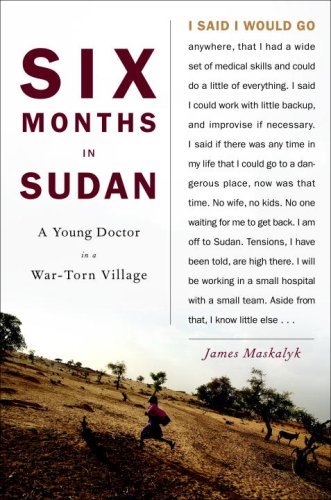Ever notice that when a topic comes up, it sometimes continues to pop up everywhere you look? That's what's been happening for the past week with me & the Sudan.
Wednesday, I randomly came across a wonderfully descriptive poem which I found out depicted a Sudanese girl.
On Friday, while paging through a number of influential photographs, I was struck in particular by a powerful Pulitzer Prize-winning photo of a starving little boy & a vulture in the background. After clicking into the details, it turned out to be taken in the Sudan.
Then today, I came across a doctor's award-winning medical memoir about his life in emergency medicine in inner-city Toronto & Ethiopia. While adding that book to my TBR, I was led to his other book about his 6-month stint in the Sudan with Doctors without Borders.
And funnily enough, that book written by a male Canadian doctor in the Sudan is related to the book you chose to read next since it was also written by a doctor, albeit a female Sudanese doctor.
So Which Sudanese Book are We Reading in June?
"Like the single white eyelash that graces her row of dark lashes–seen by her people as a mark of good fortune–Halima Bashir’s story stands out. Tears of the Desert is the first memoir ever written by a woman caught up in the war in Darfur. It is a survivor’s tale of a conflicted country, a resilient people, and the uncompromising spirit of a young woman who refused to be silenced.
Born into the Zaghawa tribe in the Sudanese desert, Halima was doted on by her father, a cattle herder, and kept in line by her formidable grandmother. A politically astute man, Halima’s father saw to it that his daughter received a good education away from their rural surroundings. Halima excelled in her studies and exams, surpassing even the privileged Arab girls who looked down their noses at the black Africans. With her love of learning and her father’s support, Halima went on to study medicine, and at twenty-four became her village’s first formal doctor.
Janjaweed Arab militias started savagely assaulting the Zaghawa, often with the backing of the Sudanese military. Then, the Janjaweed attacked Bashir’s village raping 42 schoolgirls and their teachers. Bashir, who treated the victims, could no longer remain quiet. But breaking her silence ignited a horrifying turn of events.
In this harrowing and heartbreaking account, Halima Bashir sheds light on the hundreds of thousands of innocent lives being eradicated by what is fast becoming one of the most terrifying genocides of the twenty-first century."
(A special thank you to book club member, Ester Elbert for the suggestion.)



